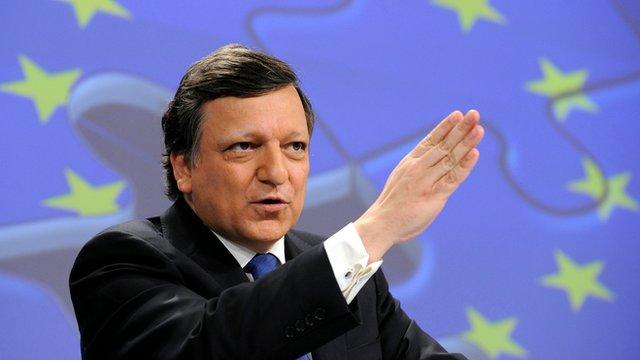The EU budget marathon
- Published
- comments
All countries do not begin from the same starting point when they assess the budget, as Gavin Hewitt explains.
Nothing focuses leaders' minds like money and budgets. The voters may not be able to follow much of the EU's business but they usually can follow what funding goes to Brussels.
However when it comes to the EU, nothing is quite what it seems. Riddles and enigmas are all wrapped together. It is enough to say that all countries do not begin from the same starting point when they assess the budget, nor do they use the same criteria.
To add to the complexity there are different ceilings for payments and for commitments. In such a world it may be difficult to judge whether leaders have got what they promised. Such is the EU budget!
The day will begin with 15-minute interviews. The leaders - beginning interestingly with David Cameron - will one by one go and see the President of the Council, Herman Van Rompuy, and the President of the Commission, Jose Manuel Barroso. Prime Minister Cameron promised that he would be "negotiating very hard for a good deal for British taxpayers and European taxpayers".
At this meeting the leaders will lay out their negotiating positions. Only in the evening will they get together and the open haggling will begin. Herman Van Rompuy hopes the interviews will provide him with the information to forge a compromise.
On the surface an agreement looks difficult. A brace of Eastern and Central European countries - particularly Poland - want the budget to increase. Many other countries, including Britain, Germany, Sweden and the Netherlands, want it reined in. That is the fundamental fault line.
The Commission had initially set out a budget costing over a trillion euros, which would have been a 5% increase. A second proposal was put on the table by Herman Van Rompuy.
That amounted to 80bn euros less. Using 2011 prices, it would cap payments made during the seven-year period at 940bn euros. That proposal has become the focus of the negotiations.
British pressure
The British see it as a useful starting point but insist Mr Van Rompuy "must go further". Depending on the method of calculation, the Van Rompuy proposal could be interpreted as a small cut in the ceilings as compared to the previous budget, but for Britain there are two problems.
Firstly it would require the UK to make a concession on its rebate, which is worth around £3bn a year.
That, according to British officials, is non-negotiable. Since it was won by Margaret Thatcher in 1984 it has acquired totemic status. Without it the British contribution would almost match that of Germany. Other countries, particularly the French, have the British rebate in their sights.
The other problem is that the British judge the budget on what is spent, what the UK Treasury actually pays to the EU.
Quite deliberately, Downing Street has not provided its target figure in the negotiations. It wants some room for manoeuvre, but my understanding is that their target remains significantly below that of Herman Van Rompuy - somewhere just under 900bn euros, compared to 940bn.
Even if Mr Van Rompuy were to satisfy the British, it would only deepen his problems elsewhere.
Poland and Spain are just two nations insisting that more funds should be spent on economic development in order to close the gap between the richer and the poorer countries. The Spanish and Italians say they are at risk of becoming net contributors and have said that is "unacceptable".
The French have threatened to use their veto if farming subsidies are reduced. Some other countries like Denmark are fighting for a rebate of their own. So every step towards the British position creates problems elsewhere.
Domestic politics
The Germans are not far from the Van Rompuy proposal and are prepared to compromise. They are protective of their neighbour Poland and do not want to see an important ally losing out.
But, like the British, they want to see a cut in administrative costs and want to see the budget rebalanced towards projects that enhance growth and innovation, with less money for farm subsidies.
If a deal is done by Friday, when the summit is due to end, it will be a major achievement. The expectation is for the meeting to run into Saturday or to collapse. German Chancellor Angela Merkel has already spoken of having to return at the beginning of next year if no deal is done this week.
Britain does not want to be blamed for failure. Downing Street - unlike when the British veto was used in December - has been making the calls and trying to find allies. There are countries which would be happy to see the UK painted as the fall guy once more.
Britain feels strongly about the budget but has a much more important fight coming up. That is over banking union. That will directly impact on the City of London. David Cameron will not want to waste goodwill on the budget when he will need every bit of support he can gather to protect the UK's financial sector.
Even so, his ability to compromise will be limited by his backbenchers, who see the budget as an opportunity to draw a line in the sand over EU spending.
It should be remembered that if no deal is reached, then the 2013 budget will be rolled over with a 2% increase in inflation. In that event decisions are taken by qualified majority voting and Britain would have less influence.
- Published21 November 2012

- Published24 September 2015